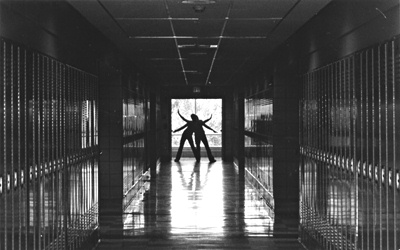All Nonfiction
- Bullying
- Books
- Academic
- Author Interviews
- Celebrity interviews
- College Articles
- College Essays
- Educator of the Year
- Heroes
- Interviews
- Memoir
- Personal Experience
- Sports
- Travel & Culture
All Opinions
- Bullying
- Current Events / Politics
- Discrimination
- Drugs / Alcohol / Smoking
- Entertainment / Celebrities
- Environment
- Love / Relationships
- Movies / Music / TV
- Pop Culture / Trends
- School / College
- Social Issues / Civics
- Spirituality / Religion
- Sports / Hobbies
All Hot Topics
- Bullying
- Community Service
- Environment
- Health
- Letters to the Editor
- Pride & Prejudice
- What Matters
- Back
Summer Guide
- Program Links
- Program Reviews
- Back
College Guide
- College Links
- College Reviews
- College Essays
- College Articles
- Back
Corporal Punishment Is Taking the Sanctuary Out of Schools
Corporal punishment is legal in schools in nineteen states; however it should not be a teacher's job to physically reprimand a student. Corporal punishment can lead to aggressive behavior in students such as bullying and abusing partners. It can also take away a student’s feeling of safety and sanctuary at school. Although corporal punishment can give kids known effects and repercussions of bad behavior, there are other ways of reprimanding a child. Corporal punishment should not be allowed in schools because although it is a way of scaring children into behaving, this form of punishment can lead to aggressive behavior and deprive students of the feeling of safety and sanctuary in school, which can harm education.
Corporal punishment in schools can lead to aggressive behavior later in life. It can lead to abusive relationships. Causing anxiety, depression, substance abuse, stress, and other mental health problems, corporal punishment can be very dangerous. Students who undergo this kind of punishment relate violence to power which leads to abusing partners. In addition, it can lead to bullying. The American Academy of Child and Adolescent Psychiatrist says, “[c]orporal punishment signals to the child that a way to settle interpersonal conflicts is to use physical force and inflict pain such children may in turn resort to such behavior themselves.” The American Academy of Pediatrics says that this form of punishment, “may contribute to disruptive and violent student behavior.” Corporal punishment can lead to aggressive behavior including abusing future partners and bullying.
Corporal punishment can lead to an unsafe and violent school environment which harms education. Corporal punishment is banned in military training and prisons because it is so harsh and unsafe. If it is too harsh for prisons and the military, how is it not harsh enough for children? Animals are also protected from this violence but children are not. Furthermore, Corporal punishment can lead to low test scores. According to “Hitting kids: American Parenting and Physical Punishment,” hitting children in kindergarten can lead to low vocabulary scores in fourth grade as well as low fifth grade math scores. Corporal punishment can harm children’s education and form an unsafe and violent school experience for children.
Corporal punishment is thought of as a way to enforce behavior and exercise self-control; however, there are other ways to successfully punish children. According to Harold Bennett, PhD, President and Dean of the Charles H. Mason Theological Seminary, “children need to understand boundaries, and I think that children need to understand that there should be punishment...in direct proportion to improper behavior that they might demonstrate.” Nevertheless, there are other ways of punishing children such as time-out, taking away privileges, and rewarding good behavior. Time- out can teach kids to calm themselves and re-analyze which are vital skills that can be used throughout their life. By taking away privileges, a supervisor can give long-lasting penalties and remind children of what can happen as a repercussion. Finally, if you reward good behavior, this reminds children of how good it feels to do something right rather than simply showing them how bad it feels to do something wrong. Although corporal punishment can scare children into behaving, this is not the only way to punish a child.
Corporal punishment should not be allowed in schools because it can take away feelings of safety in school and influence violent behavior. This form of punishment can lead to aggressive behavior. Corporal punishment can also lead to a deprivation of a feeling of safety in schools and harm education. Although this can scare children into behaving, there are other successful forms of punishment. Corporal punishment is a way of punishing children that should not be legal and can leave undesirable effects, and this argument should be made known to people in all areas to educate those who may not understand its harmful effects.

Similar Articles
JOIN THE DISCUSSION
This article has 0 comments.

I am someone who is strongly against corporal punishment in many forms but I specifically feel that it is innapropriate in schools especially. This piece contains some of my opinions as well as the opinions of others that I feel support this argument.